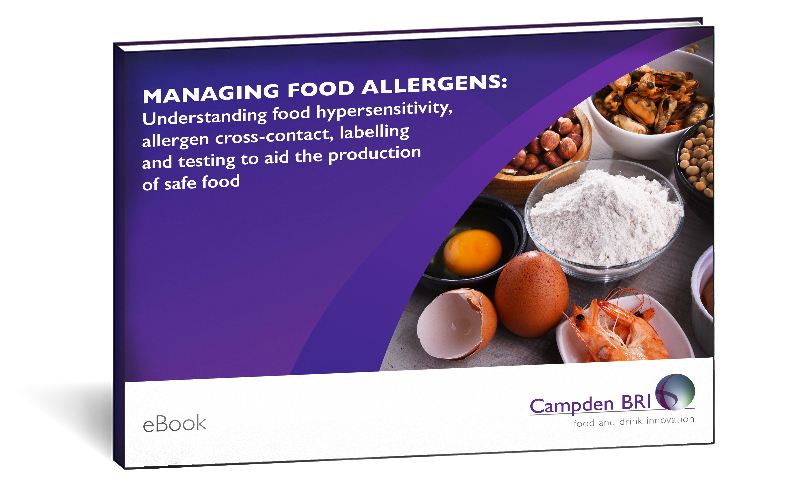
Changes to gluten-free labelling legislation
6 July 2016 | Helen Arrowsmith, Regulatory Affairs Manager and Allergen Specialist
The legislation regarding gluten-free labelling and information is changing; new rules apply from 20 July 2016. The UK interpretation of the new EU Regulation will have a significant impact on what can be stated on labels and in catering establishments.
Since 1 January 2012 Commission Regulation (EC) No. 41/2009 has laid down harmonised rules concerning the composition and labelling of foodstuffs suitable for people intolerant to gluten, but from 20 July 2016 this Regulation will be repealed by Regulation (EU) No. 609/2013.
From this date, rules relating to gluten will be provided by Regulation (EU) No. 1169/2011 on the provision of food information to consumers (EU FIC), and Commission Implementing Regulation (EU) No. 828/2014 on the requirements for the provision of information to consumers on the absence or reduced presence of gluten in food. National provisions allowing for enforcement at UK level have been drafted as an amendment to the Food Information Regulations in Northern Ireland, Scotland and Wales. Consultations on these draft amendments are currently taking place. As yet, no consultation has been issued to enforce Regulation (EU) No. 828/2014 in England. It is understood that a new Statutory Instrument will be drafted, but this will not be put forward for consultation until after the 20 July deadline. In the meantime, the legislation concerning gluten-free labelling will be enforced through the Food Safety Act 1990 and the Food Safety and Hygiene (England) Regulations 2013.
Download our FREE Managing Food Allergens eBook today! Secure food safety, control and confidence through effective allergen management

On 25 May 2016, the Food Standards Agency (FSA) wrote to interested parties to advise that statements such as ‘no gluten-containing ingredients’ would not be permitted from 20 July 2016. It is believed that this is based on a strict interpretation of the wording in Article 3 (1) to Regulation (EU) No. 828/2014, which states:
Where statements are used to provide information to consumers on the absence or reduced presence of gluten in food, such information shall be given only through the statements and in accordance with conditions set out in the Annex.
The Annex to the Regulation stipulates the following with regard to statements on the absence or reduced presence of gluten in food that are allowed to be made and conditions thereof:
- A. General requirements
- GLUTEN-FREE
The statement ‘gluten-free’ may only be made where the food as sold to the final consumer contains no more than 20mg/kg of gluten. - VERY LOW GLUTEN
The statement ‘very low gluten’ may only be made where the food, consisting of or containing one or more ingredients made from wheat, rye, barley, oats or their crossbred varieties which have been specifically processed to reduce the gluten content, contains no more than 100mg/kg of gluten in the food as sold to the final consumer.
- GLUTEN-FREE
- B. Additional requirements for food containing oats
- Oats contained in a food presented as gluten-free or very low gluten must have been specifically produced, prepared and/or processed in a way to avoid contamination by wheat, rye, barley or their crossbred varieties and the gluten content of such oats cannot exceed 20mg/kg.
Implications of the legislation changes
It is understood that the application of the legislation from 20 July 2016 has the following implications:
- Prepacked foods – ‘no gluten-containing ingredients’ statements will not be permitted on the label of prepacked foods
- Individual meals on menus in food service settings – ‘no gluten-containing ingredients’ statements will not be permitted to refer to individual food products/meals
- Positive list headings in retail or menu titles in food service settings - ‘no gluten-containing ingredients’ statements will be permitted to refer to several dishes/meals
The FSA is currently looking at a transition period to allow food business operators to make changes to food labels and information, but at present this has not been confirmed. The FSA has recommended that where ‘no gluten-containing ingredients’ claims are being used on packaging or against individual menu items, the food business and the local food enforcement body work together, and ensure that a graduated and proportionate enforcement approach is taken.
What is the difference between coeliac disease and allergy to cereals?
It is important to consider that coeliac disease is intolerance to gluten, whereas some other people can be allergic to cereals. The proteins that are clinically relevant to those with an allergy to wheat have been found to include gluten, but other proteins have also been found to be involved, e.g. albumins, globulins, α-amylase inhibitor and lipid transfer protein (see EFSA opinion (2014) for further information). The labelling of cereals containing gluten required by Article 9 (1) (c), Article 21 and Annex II to the FIC therefore relates to those cereals to which people are allergic (there is no ‘threshold’ below which labelling is not required, although some exemptions do apply, see FIC Annex II), whereas legislation regarding ‘gluten-free’ refers to coeliac disease, where a ‘threshold’ of 20mg gluten/kg has been determined to protect the majority of people with coeliac disease.
White paper download
Click below to download a copy of the white paper in PDF format
How can we help you?
If you’d like to find out more about allergen labelling, contact our Regulatory Affairs team to find out how we can help.







